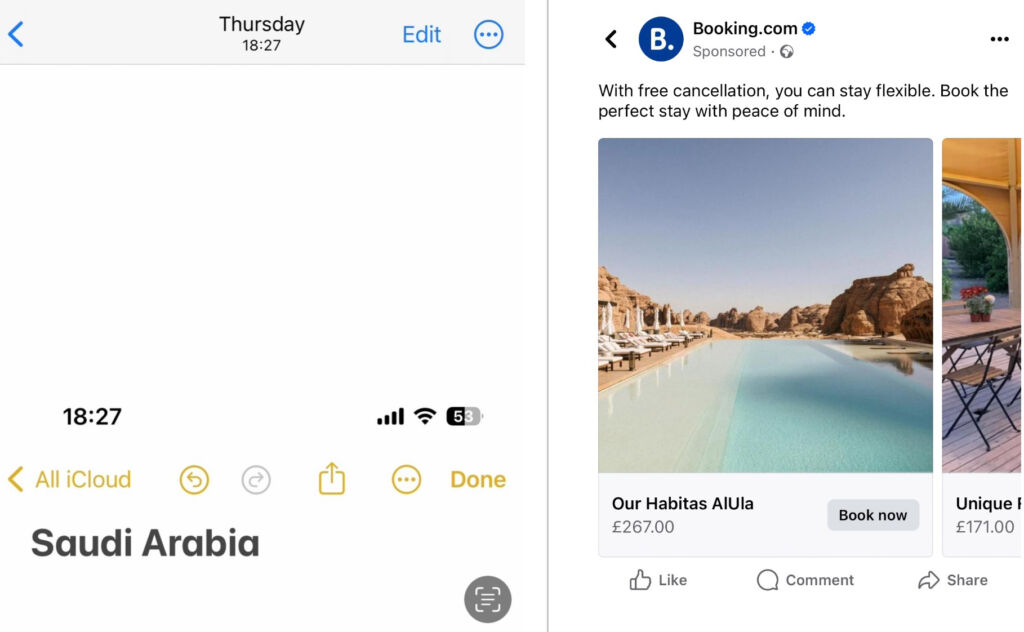

Let’s not beat around the bush; it is well known that ‘big tech’ is, let’s call it, ‘tuning’ into one’s conversations. Whether justified or legal, this is of significant concern to millions worldwide. Fortunately, researchers at NordVPN have devised a test that will show if you are being subjected to this.
Although many would wish it wasn’t the case, your phone really is listening to you! A simple test devised by researchers at NordVPN shows how to catch your device eavesdropping on your conversations. Smartphones listen to what you’re saying via your device’s built-in microphone, which is always on so virtual assistants can hear voice commands.
These virtual assistants also listen to your background conversations and send you personalised ads based on what you’ve been talking about. To catch the technology in the act, researchers at NordVPN devised a test to see what would trigger this phenomenon.
One member of the NordVPN research team investigated whether speaking about countries—selected at random—would increase advertisements from tourist boards and other hospitality companies in those countries.
The research revealed that the researcher speaking about how much they would like to visit Saudi Arabia resulted in Facebook adverts from Booking.com showing hotel prices in AlUla. Saudi Arabia was noted in an app on Thursday, July 25th, and adverts for hotels in AlUla appeared three days later, on Sunday, July 28th.
Images to show the technique for the eavesdropping test using the smartphone notes app:


Meanwhile, another member of the research team also began to speak about a random animal—in this case, an orangutan. One day later, they started to receive ads related to orangutan charities.


The legality of this practice hinges on user consent. It’s legal when users agree to terms and conditions or adjust settings to allow listening. However, any app spying without consent is illegal.
Consumers can test if their phone is listening by discussing a unique topic near their device and observing if related ads appear in the following days or weeks.
A simple four-step test to determine if your phone is spying on you:
1. Select a Unique Topic:
- Choose a subject you’ve never searched for or discussed near your devices.
- The topic should be unrelated to your usual interests or online behaviour.
2. Discuss the Topic:
- Over several days, have multiple conversations near your phone about your chosen topic.
- Use specific keywords related to your topic. For example, if you’ve never considered visiting a specific country, start talking about hotels in that place or sights to see.
3. Maintain Normal Phone Usage:
- Continue using your phone as you normally would, but do not search for or interact with content related to your test topic.
- Keep your phone nearby during your verbal discussions, but don’t change any other aspect of how you use it.
4. Observe and Analyse:
- Over the next few days or weeks, pay close attention to the ads you see on your phone and other devices.
- Look for advertisements related to your verbally discussed topic appearing on apps, websites, or social media platforms.
- If you start seeing ads related to your chosen topic, it may indicate that your phone has been listening and using that information for ad targeting.
Marijus Briedis, NordVPN’s Chief Technology Officer, commented, “We have all encountered it at some point in our digital lives—an advert appears for something we were only talking about recently.
“While we typically brush them off as innocent and necessary, they are a strong indicator that you are allowing your device too much access to your personal data and interests.
“To safeguard your privacy, make sure to review and limit app permissions on your devices. Be particularly cautious with microphone and location access. Remember, convenience often comes at the cost of privacy.
“Regularly audit your social media privacy settings and be mindful of the information you share online. Even seemingly innocent details can be used for targeted advertising or more nefarious purposes.
“You can also encrypt your online communications and sensitive data by using a VPN service, such as NordVPN when connecting to public Wi-Fi networks to prevent eavesdropping.”
Marijus Briedis goes on to recommend six expert tips to maintain smartphone privacy:
- Verified downloads only: Only download apps, especially virtual assistants, from official stores. Third-party sources often lack security checks, exposing your device to malware. The convenience of unofficial apps isn’t worth the security risk.
- Scrutinise app permissions: Regularly audit your app permissions. Be wary of unnecessary access requests to your microphone, camera, or location. These are often red flags for data harvesting. Remove unfamiliar apps immediately, as they could be a front for cybercrime.
- Manage voice assistant data: Voice assistants are data goldmines. Google and Alexa users should regularly clear their voice history. This data, while used for service improvement, poses a privacy risk if breached. Remember, your voice commands can reveal a great deal about your personal life.
- Use a robust VPN: A Virtual Private Network is now a necessity, not an option. Quality VPNs like NordVPN encrypt your entire data stream, significantly hampering cybercriminals’ ability to intercept your information. This is crucial, especially on public Wi-Fi networks.
- Prioritise software updates: Outdated software is like an unlocked door. Regular updates aren’t just about new features – they’re critical security patches. Delaying updates gives hackers a roadmap to exploit your device. Always update promptly.
- Leverage built-in security: Use your smartphone’s security tools. Enable two-factor authentication to prevent unauthorised access. iOS users should activate ‘Erase Data’, while Android users should use encrypted backups and ‘Find My Device’. These tools are your first line of defence.
For more information about NordVPN’s test and the specifics on how to turn off these unwanted eavesdropping settings, you can read a helpful guide here.
